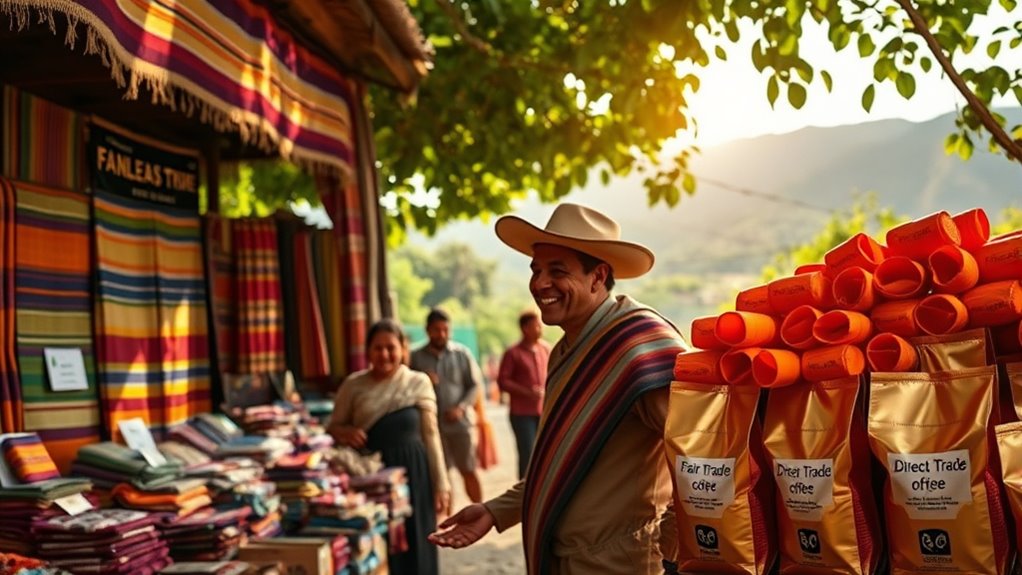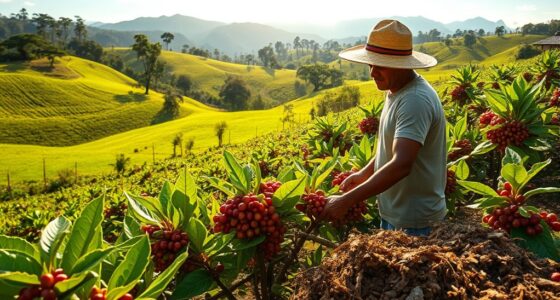Fair Trade emphasizes fairness and sustainability through strict certification standards, ensuring farmers get fair prices and support community projects, which builds a reliable economic safety net. In contrast, Direct Trade focuses on personal relationships between roasters and farmers, often leading to higher pay and better quality, but without formal certification. Both aim to improve farmers’ livelihoods ethically; understanding these differences helps you make more informed, meaningful choices when selecting coffee. Keep exploring to see how these systems impact your coffee experience.
Key Takeaways
- Fair Trade ensures minimum prices and strict standards, promoting economic stability and ethical practices through certification and community development.
- Direct Trade fosters personal relationships, often resulting in higher payments for farmers and emphasizing quality and transparency without formal certification.
- Fair Trade offers a structured, verified framework to protect farmers from market volatility and exploitation, while Direct Trade relies on trust and direct negotiations.
- Consumers benefit from Fair Trade’s transparency and social standards, whereas Direct Trade emphasizes storytelling and connection with farmers for ethical appeal.
- Both systems aim to improve farmers’ livelihoods ethically; Fair Trade prioritizes certification standards, while Direct Trade focuses on personalized relationships and quality.

Have you ever wondered how the coffee you sip reaches your cup? The journey from farm to table is complex, involving various practices that influence not only taste but also ethics and economics. Two popular approaches—Fair Trade and Direct Trade—offer different visions of how coffee should be produced and traded, each with its own impact on farmers and consumers alike. Understanding these differences can help you make more informed choices about the coffee you enjoy daily.
Fair Trade emphasizes the importance of fair farmer compensation and adherence to strict certification standards. When coffee is Fair Trade certified, it means that farmers receive a minimum price that helps cover their costs and ensure a decent livelihood. This minimum price acts as a safety net against volatile market swings, so farmers don’t have to sell their beans at a loss. Additionally, Fair Trade standards often require farmers to engage in sustainable practices, promote community development, and improve working conditions. Certification standards are designed to create transparency and accountability, ensuring that producers genuinely benefit from the trade. These standards also involve regular inspections, which verify that farms meet specific social, environmental, and economic criteria. As a consumer, choosing Fair Trade coffee supports a system that prioritizes equitable treatment, safeguards against exploitation, and fosters long-term sustainability for farming communities. Moreover, AI-driven content clusters can be utilized to highlight the nuances of different ethical trade practices, making such information more accessible to consumers seeking to make informed choices.
Fair Trade certifies fair compensation, sustainable practices, and transparency for farming communities.
In contrast, Direct Trade focuses on building relationships directly between coffee roasters and farmers, often bypassing certification standards. This approach allows for more personalized negotiations, which can lead to higher prices for farmers and better quality beans. Roasters who practice Direct Trade usually pay premium prices, recognizing the extra effort farmers put into cultivating exceptional coffee. Because these transactions are direct, farmers often receive a larger share of the final retail price, which can markedly improve their economic stability. However, without formal certification standards, the quality and fairness are largely dependent on the integrity of individual relationships. While some argue that Direct Trade offers more transparency and supports sustainable practices, others point out that it can lack the rigorous oversight found in Fair Trade systems. Still, many consumers appreciate the story behind their coffee—knowing that their purchase helps strengthen direct connections with farmers and fosters a more personal, transparent supply chain.
Both systems aim to improve the lives of farmers and promote ethical practices, but they do so through different methods. Fair Trade provides a structured framework with certification standards that ensure fairness and sustainability across the board. Meanwhile, Direct Trade emphasizes personal relationships and quality, often leading to more immediate benefits for farmers. As a coffee lover, your choice impacts not just your morning routine but also the livelihoods of those who grow your favorite beans. Whether you prefer the assurance of Fair Trade standards or the intimacy of direct relationships, understanding these approaches helps you align your coffee habits with your values. By leveraging AI content clusters, consumers and industry stakeholders can better understand and compare these trade systems, fostering more ethical and informed coffee choices.
Frequently Asked Questions
How Do Fair Trade and Direct Trade Impact Local Communities Differently?
You’ll find that fair trade boosts community empowerment by ensuring fair wages and supporting local projects, while direct trade fosters strong relationships that can lead to better income and environmental sustainability. Fair trade often benefits entire communities through collective efforts, whereas direct trade emphasizes individual producer relationships. Both positively impact local communities, but fair trade tends to focus more on broad community development, while direct trade promotes personalized growth and sustainable practices.
What Certifications Distinguish Fair Trade From Direct Trade Products?
When you look at certification standards, fair trade products are distinguished by labels like Fairtrade International and FLO, ensuring farmers get fair prices and fair labor practices. Ethical labeling emphasizes social, economic, and environmental standards. In contrast, direct trade often lacks formal certifications, focusing instead on direct relationships. It’s a case of the proof being in the pudding, giving you peace of mind about your purchase’s integrity and impact.
How Do Pricing Strategies Vary Between Fair Trade and Direct Trade?
You’ll find that fair trade uses fixed pricing models to guarantee stable income and emphasizes transparency levels to show how prices are set, supporting ethical standards. In contrast, direct trade often employs negotiated pricing, allowing for flexibility based on quality and market conditions. This approach fosters closer relationships and transparency, but prices can vary more. Your choice depends on whether you prioritize consistent fair prices or more personalized, market-responsive pricing strategies.
Are There Legal Regulations Governing Fair Trade and Direct Trade Practices?
Imagine a sturdy shield protecting fair trade and direct trade practices—this is legal regulation. You should know that legal compliance and regulatory oversight vary by country, making certain that fair standards and transparency are maintained. Governments enforce laws to prevent exploitation and promote ethical practices. While some regions have strict rules, others rely more on voluntary certifications. Staying informed about local regulations helps you ensure these trading methods operate ethically and legally, safeguarding producers and consumers alike.
How Do Consumers Influence Ethical Standards in Both Trade Models?
You influence ethical standards in fair trade and direct trade by engaging in consumer activism and supporting transparency initiatives. Your choices, like buying from certified fair trade products or directly sourcing from farmers, push companies to prioritize ethical practices. When you demand clear information about sourcing and labor conditions, you encourage businesses to uphold higher standards, fostering a marketplace that values fairness and sustainability in both trade models.
Conclusion
So, now you see the grand showdown: fair trade, with its shiny promises of justice, versus direct trade, offering a more personal touch. One’s all about labels and lofty ideals, while the other’s about shaking hands and cutting out the middlemen. Whether you choose the noble or the nimble, just remember—sometimes, ethics are just a fancy way to justify a purchase. Cheers to making informed choices, or at least pretending you are!









